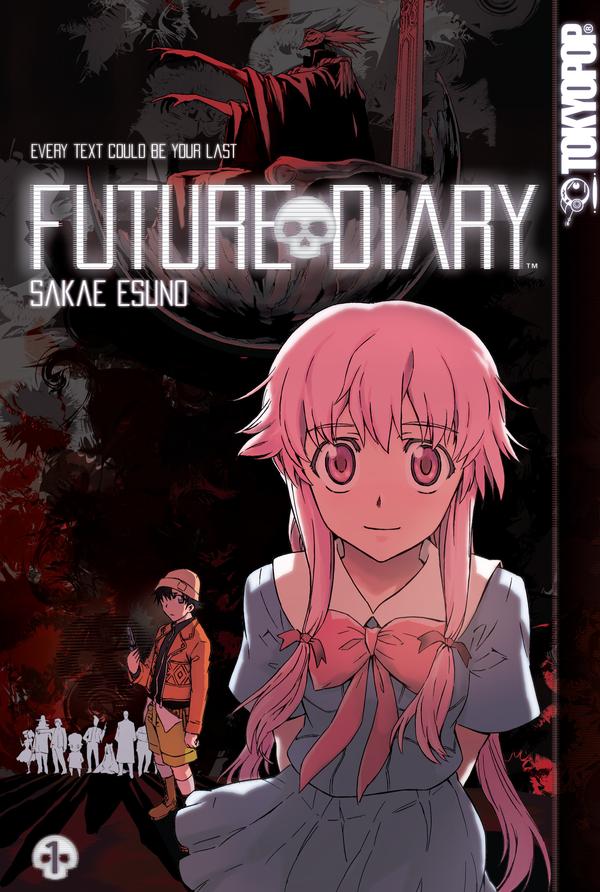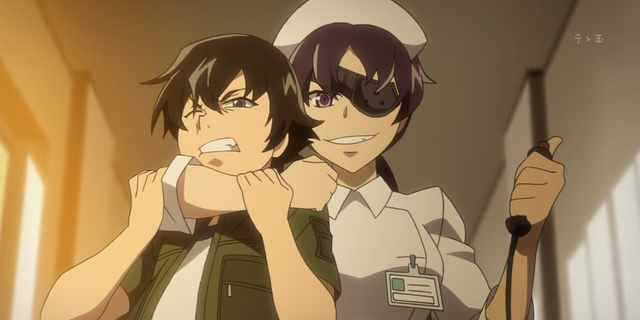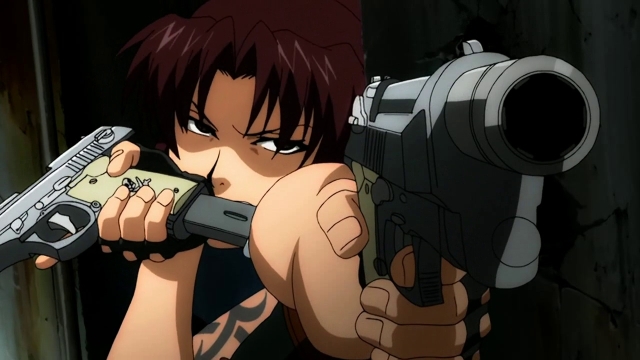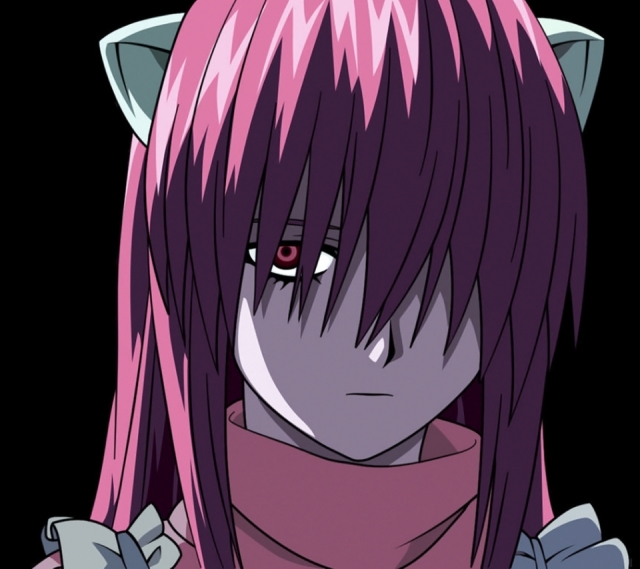Well, dear readers, I finally broke down and decided to watch Mirai Nikki due to my sister’s insistence. I have seen about thirteen episodes of this well known series thus far, and find it rather enjoyable. The first thing to strike me was how similar it seemed to Elfen Lied: the insane, pink-haired, crazed killer, many violent, bloody deaths, and the abnormal fighting abilities of the contestants. Despite these similarities, there is a difference in mood between the two shows, which boils down to the variance with which they treat the concept of evil. (I can see it all now: people who consider Elfen Lied a vacuous show are going to hate this article.)
Haven’t you noticed this yourselves? The plot of Mirai Nikki is centered around a game prepared by “the god of time and space” in which the contestants annihilate each other in order to gain the god’s title. Creating the setting of a game does much to minimize the effect of the atrocious crimes committed therein. All the casualties become pawns in a chess game. This takes away from the impact of say killing scores of school children, taking invalids hostage, wretchedly treating prisoners, and even creating a twisted young child to be killed for the purposes of the game–I’m referring to a diary holder.
Conversely, Elfen Lied causes us to feel sorrow whenever someone is slain or even when they are merely struck. The sinfulness of the action strikes us. I believe this involves the fact that Lynn Okamoto was probably influenced by the religion of the Lutheran minister who wrote the eponymous poem. So, we are struck by a sense of sin pervading the show. Lives are lost; but, the wickedness of these acts are not lost on us, as they tend to be in Mirai Nikki. So, the main divergence between the two shows appears to be religious: the Christian God in Elfen Lied–albeit, with the Lutheran conception of the depravity of man tainting the world–vs. the rather Assyrian god of Mirai Nikki, who enjoys playing with other people’s lives.
The curious case of #9, Uryuu Minene, offers the most striking example of how Mirai Nikki‘s world misunderstands the problem of evil. We are introduced to this character as a monster who’s willing to sacrifice school children in order to achieve her goals. To speak plainly, she’s rather loathesome, right? Then, she fails in her object due to Yukiteru taking out her eye, she suffers greatly in making her escape from the police, and endures humiliation, pain, and betrayal from the “justice” besotted contestant (the conception of justice held by this character makes one fear for how the manga-ka views justice himself), and goes on to become perhaps the most likeable character in the show–at least, in my case. (Could it be a perceived resemblance to Revy of Black Lagoon?)
How is it that we can so easily warm up to a character who’s first shown us committing heinous crimes? The suffering which followed her debut might be said to partially atone for her wrongs, but can they really be enough? Her character even undergoes a change as she becomes level-headed, and we only rarely glimpse her maniacal smile. And so, evil seems to result from insanity rather than malice. We cannot really hold an insane person guilty, therefore no need for atonement.
By the deep seated guilt of many of the characters, Elfen Lied acknowledges that, no matter what evil influences have twisted a person’s personality, they still sin by their own free choice. This visibly taints their souls and places a burden of judgment upon them. We, the viewers, sense this and develop true antipathy toward certain characters.
An exception to this rule in Elfen Lied is Lucy herself. Her very guilt makes her sympathetic. She would like to obtain forgiveness, and Kohta tries to give it to her. However, Lucy knows in her heart of hearts that murder cannot be taken back, that the blood tainting her soul can’t be brushed aside or blamed on anyone else. The only person who can erase such a thing is found in the lyrics of the opening song to that show: “O Lord, O Sacred Fire, have mercy!” For God alone can forgive sins. Excuses based on one’s mental state or tragic background don’t cut it.
Ultimately, Elfen Lied‘s biggest failure in understanding human nature is the doctrine of total depravity which runs through the show. But, it still knows human nature better than Mirai Nikki. This makes it the better show of these rather similar works. So, what do you think, my dear readers? Which show really has a better perception of human nature and the mystery of evil?









I agree, There were many self-justifications through the series of Mirai Nikki that seemingly absolved them of any blame. For example the whole notion of the game is necessary, otherwise reality falls apart unless there is an heir to Deus; but, likewise, any actions of the diary holders are necessary, for this is how the game is decided. In a short phrase, the sacrifice of a few for the good of the many.
On an other anime, have you been watching Psycho-Pass? Strong loss of the understanding of sin via psychology in this one (I mean, I imagine that was the author’s intent, the whole show being a dystopian genre). I’ve been thinking about writing on that soon.
LikeLike
I haven’t seen Psycho-Pass yet, but I ought to soon. The plot sounded very intriguing–even if they stole the main idea from Minority Report.
I’ll be looking forward to your article!
LikeLike
I find Elfen Lied to be vacuous, but I still enjoyed your article. 🙂
LikeLike
Glad to hear it! The similarities between the two shows struck me, which helped to pick up on the theme discussed above. At least, it made for a good article.
LikeLike
[…] Medieval Otaku compares how Mirai Nikki and Elfen Lied each demonstrate the nature of human sinfulness. [Medieval Otaku] […]
LikeLike
[…] UPDATE: Here’s a link to a defender of Elfen Lied, with an article on the newer series Mirai NikkiR…. […]
LikeLike
[…] response that didn’t make it in (though thankfully, someone else mentioned that irredeemable [or is it?] […]
LikeLike
You understanding of these anime’s are good
I think you had missed something about Lucy. She has split personalty’s this is clear. At some point in Lucy’s life she decided(or almost decided) that all humans are not people. It is never said that could be the reason why others feel that way too.
It most clear when Lucy says “I have never killed a person”.
This does go both ways.
The humans tend to feel the same about Lucy and other of her race too.(The few that know about them.)
LikeLike
That’s true: Lucy says she doesn’t think of human beings as people. But, I think that this involves lying to herself in some way. In the same way, an American during the Indian Wars might claim that American Indians are savages or subhuman, but you can see the effect on such people’s psyches of treating the Indians as if they were not people. Such people tended to become merciless and hate-filled, which is what we see in Lucy. Now, we see hunters killing deer or whatever animal they like, but their psyches do not undergo the same change. So, I think that perhaps Lucy’s guilt is even compounded by they fact that she tries to imagine human beings as nonpersons. And, especially by the end of the show, she cannot deny that she’s a murderer, which seems to be the ultimate obstacle in her having a complete reconciliation with Kouta.
But, that’s my understanding of it. Thanks for your compliments!
LikeLike
[…] any rate, Girls und Panzer and Future Diary provided excellent entertainment with the later raising some interesting moral questions. I rather enjoyed both, though I admit to Future Diary being somewhat of an acquired taste. At […]
LikeLike
I like elfen lied one of my favorite anime’s and this article is good but I will agree with you side of you opinion
LikeLike
Thanks! I’m glad that you liked the articles. It’s one of my great joys to draw connections between anime, and the similarity between Mirai Nikki and Elfen Lied really stood out.
LikeLike
While I agree that Elfen Lied does portray human nature better, I still found Mirai Nikki the more enjoyable of the two.
LikeLike
Ha! Well, I enjoyed Elfen Lied more for all its darkness. The fact that the characters of Mirai Nikki tended to be devoid of conscience–as the indeed the entire world tended to be–made them feel less like real people. I could identify more with the characters of Elfen Lied who were afflicted with guilt, maybe because I’m Catholic. 🙂
Anyway, they are both worthwhile shows. And, you know what they say: de gustibus non est disputandum.
LikeLike
I think both Elfen Lied and Mirai Nikki were good. And endings of both kept me hanging.
LikeLike
I agree. The manga of Elfen Lied gives a much more complete story. You might try that. Also, the mangaka’s Gokukoku no Brynhildr uses a similar plot to Elfen Lied, and is quite good up until the end of the Valkyria Arc. Afterwards, he does not know what to do with the story. He sadly seems to only be able to write one kind of tale.
LikeLiked by 1 person
Yeah, I’m thinking of reading the manga 😀
LikeLike
[…] Medieval Otaku compares how Mirai Nikki and Elfen Lied each demonstrate the nature of human sinfulness. [Medieval Otaku] […]
LikeLike
I think the whole basic problem when people write evil and write a tragic backstory in and it seems to make the character “gooder” IS a misunderstanding of sin….a deliberate one, perhaps. In a weird sense, I think we ourselves often fall towards the mistake of believing that the fact that we went through pain absolves of our sins. But pain doesn’t make you less guilty. It just makes you more likely to BE guilty of something. I’m not sure I exactly agree with the fact that a little rich girl who has never felt hunger and cold and abuse is on the same starting footing as a person who grew up in poverty in an abusive household……But I think that God knows that. And He is the ultimate judge.
LikeLike
That is very true. One can’t say that a thief is not guilty because he grew up without a father, surrounded by vicious people, and without a moral education. The most one can say is that he is less guilty because of his ignorance, lack of good examples, and, perhaps, want. For those reasons, he might deserve leniency–less time in jail or perhaps the choice of joining the Marines instead of jail time. (I’m not sure if the latter is still done.) Someone who’s suffered less and received a fine moral education seems to deserve less pity in our eyes. After all, he goes against his training, while the other imitates those around him and has less understanding of justice and goodness.
The case of Lucy is a bit more complicated, because everyone knows in their heart of hearts that murder is wrong. Nevertheless, she seems not to have had parents and undergone atrociously bad experiences which warped her into, essentially, Satan’s tool for murder. (The spiritual battle between good and evil is much more apparent in the Elfen Lied manga.) Lucy forms the conception that she is not human and at war with humanity with each man, woman, and child being a combatant. I think that she knows what she is doing is wrong (the reason for her Lucy/Nyu schizophrenia), but allows the evil treatment she received at the hands of other people to continue to drive her. Nevertheless, the evil treatment she received makes us pity her and hope that she overcomes her drive for vengeance (or malice against the human race) and defeats the devil.
Have you read the Elfen Lied manga? It’s grisly and explicit, but I thought the themes of it were pretty deep.
LikeLike
[…] response that didn’t make it in (though thankfully, someone else mentioned that irredeemable [or is it?] […]
LikeLike
This is one of the more interesting essays I have read on Elfen Lied ( I haven’t seen Mirai Nikki). Every few years I go back and rewatch EL and still find it a great experience. Funny how it seems to have a very vocal group of haters in the anime community, but the blu rays sales are ranked fairly high on amazon.
I think the manga benefited from its anime adaptation. It had this nostalgic, dream-like quality that is very distinct and so much of the feelings I get from the series. Rearranging plot points, like revealing Kouta and Lucy’s past later on in the story made more sense to me.
The first time I watched it, the intro artwork and lyrics about resisting temptation gave me a very ominous feeling about all of the ecchi scenes. I’m torn on the ending though. I think the anime’s smaller scale ending fit better with the tone of the show, while the manga gave more substance and badly needed closure to the story. I wish the two could have been crammed together somehow.
I take it you like the manga better though? Maybe I need to go and reread it.
LikeLike
The manga offers a much more complete story and addresses its themes far better. So, I’d highly recommend reading the manga.
I can understand why so many anibloggers hate Elfen Lied. It’s been accused of providing cheap thrills and being rather vacuous overall. No anime critic wants to people to think that’s why he watches anime! But, the song provides some much needed context to the anime. Nudity can give the air of innocence, but the blood-red background shows that air of innocence is tainted and in fact not innocence at all.
The greatest hurdle to an anime critic developing an appreciation for Elfen Lied is that sin is the primary topic, and not many people understand or recognize sin: a free act against moral law. Sin, freedom of the will, and objective moral law are decidedly unpopular topics in colleges and universities. Most bloggers have been influenced by academia, and it’s hard to get into a show which focuses on an idea one denies the existence of. But, the main culture still believe in freewill, moral law, and sin, which explains some of the disparity between most anibloggers’ opinions and overall sales of Elfen Lied.
LikeLike
That’s an compelling point on the recognition of sin. Society could be seen as being driven forward by the human spirit, whether figurative or literal. But in order to accept the soul as fundamental cause, we must experience the soul as real. So I see this as a more intuitive, rather than doctorinal issue; the quality of ‘realness’ is a sensation that is hard to teach.
In Elfen Lied, the struggle for the purity of soul has great consequence, because if one’s ’cause’ is tainted, then the resulting actions will end in tragedy. Maybe this kind of moral struggle is something that some critics cannot relate to. I think purity is another concept that has fallen out of intellectual fashion.
This discussion has helped clarify these thoughts I’ve been having recently.
LikeLike
I very much agree with many of your points. I am currently trying to get my way through Future Diary, but I have watched the entirety of Elfen Lied many times–
On to my point, I have come to the conclusion that yes, Elfen Lied does have a much better understanding of human nature, and I believe that is because of its religious basis. But, that’s just my input.
LikeLike
Rater, I should say strong and obvious religious basis.
LikeLike